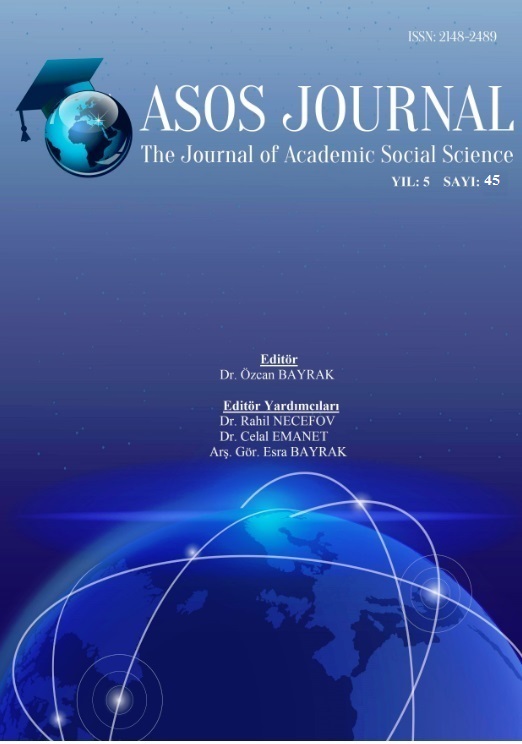ÖRGÜTLERDE SOSYAL SORUMLULUK OLGUSUNUN TÜKETİCİLERE ETKİSİ: ÇEVRE VE İNSAN FAKTÖRLERİNİN ELE ALINMASI
Author :
Abstract
Örgütlerin faaliyetlerinden tüm paydaşları etkilenmektedir. Bu nedenle, örgütler paydaşlarına karşı sorumluluk taşımalıdır. Kurumsal sosyal sorumluluk olarak adlandırılan bu olgunun başarı ile gerçekleştirilebilmesi için her bir paydaşın örgütten hangi konularda sorumluluk üstlenmesini istediklerinin ve bu isteklerinin hangilerinin daha önemli olduğunun belirlenmesi gerekmektedir. Aksi takdirde, örgüt var olan kıt kaynaklarını etkin olarak kullanamayacaktır. Bu çalışma, tüketicilerin sosyal sorumluluk konusunda örgütlerden beklentilerinin ve bu beklentilerin önem düzeylerinin belirlenmesini, dolayısıyla da pazarlama stratejileri geliştirilerek örgütlere öneriler getirilmesini amaçlamaktadır. Tüketiciler, örgütlerin davranışlarına önem vermektedir. Örgütler, kendi inisiyatifiyle veya başkaları tarafından desteklenerek, Kurumsal Sosyal Sorumluluk (KSS) görevini yerine getirmektedir. KSS geniş anlamlı bir kavramdır ve örgütlerin, topluma karşı uzun vadede bir iz bırakmasını sağlar. KSS, çevre/sürdürebilirlik sorumluluğu ve çalışanlarla uyumluluk ile hedef pazarlama sorumlulukları yansıtır. Stratejik bakımından örgütler, özellikle çevre konusuna odaklanmaktadırlar. KSS kullanımı, iki rolde (Licence to operate ve Licence to sell) süreklilik olarak yapılır, ayrıca sadakat, kimlik ve artan satın alma isteği olarak, ödüllendirilmektedir. Ancak KSS mutlak bir satın alma nedeni olmamaktadır. Tüketiciler için mutlak satın alma isteği, fiyat ve kalite ağırlıklı olmaktadır. Tüketiciler KSS inisiyatifine çelişkili yanıtlar vermektedirler. Bir tüketici için faydalı olan diğerine fayda sağlamayabilir. Bu bağlamda tüketiciler, sosyal sorumluluk ilkesini yerine getirmeyen örgüte karşı daha duyarlı davranırlar. Bu herhangi bir şekilde örgütlerin KSS çabalarının ve gerekliliğinin kaçınılmaz olduğunu gösterir. Örgütün KSS ilkeleri hakkında, tüketicilerin olumlu duygularının oluşması için, bilgilenmeleri gerekir. Tüketiciye ulaşmak için üç unsur rol oynar: Uygunluk (Fit), Motivasyon (Motivation) ve Zaman (Timing). Örgütlerin KSS aktiviteleri, kendiliğinden oluşursa (proaktif), bir tepki amacıyla oluşursa (reaktif). Pro aktiviteler iyi uygunluk ve motivasyon gösterirse tüketicinin ikna, tutum ve niyetleri düzeltme yönünde gelişme sağlar.
Keywords
Abstract
Companies must have responsibility for the welfare of their stakeholders since their stakeholders are affected from their activities. In order to successfully fulfill these responsibilities, which are called corporate social responsibility – the requirements of the stakeholders from the company and the importance levels of these requirements should be determined. Otherwise, the company can not effectively allocate its resources between these requirements. This study aims to identify the requirements of consumers from companies regarding company’s social responsibility and the importance level of each requirement in order to develop marketing strategies as a recommendation. Consumers place a value on the conduct of the companies the products of which they purchase. More and more companies are accepting their own responsibility, either at their own initiative or encouraged by external forces, for engaging in Corporate Social Responsibility (CSR). CSR is a broad concept built around the idea of the longterm 'footprint' that a company leaves on society. CSR can be expressed in areas such as responsibility for the environment/sustainability, its treatment of personnel or target marketing. From a strategic perspective, retailers appear to prefer to focus primarily on the environmental side, and this is seen in their actions. Engaging in CSR is rewarded not only by continuity of the licence to operate and licence to sell, but also by loyalty, identification and increased purchasing inclination. However, in practice it appears that at the moment of purchase, CSR is not necessarily the make or break purchasing motivation. For the consumer, other aspects such as price and quality carry more weight. Consumers respond in a variety of ways to a CSR initiative; what may work on one consumer can fall flat with another. It also appears that consumers appear to be more sensitive to the 'irresponsible' conduct of a company than the 'responsible' conduct. Nonetheless, consumers do need to have some notion of the efforts being made by a company. They can only develop a positive feeling about the CSR policy of a company once they know about it (or are given the opportunity to learn of it). Three elements play a role in reaching the consumer: fit, motivation and timing. Proactive CSR initiatives with good fit and motivation lead to improvement of the convictions, attitudes and intentions of the consumer.
